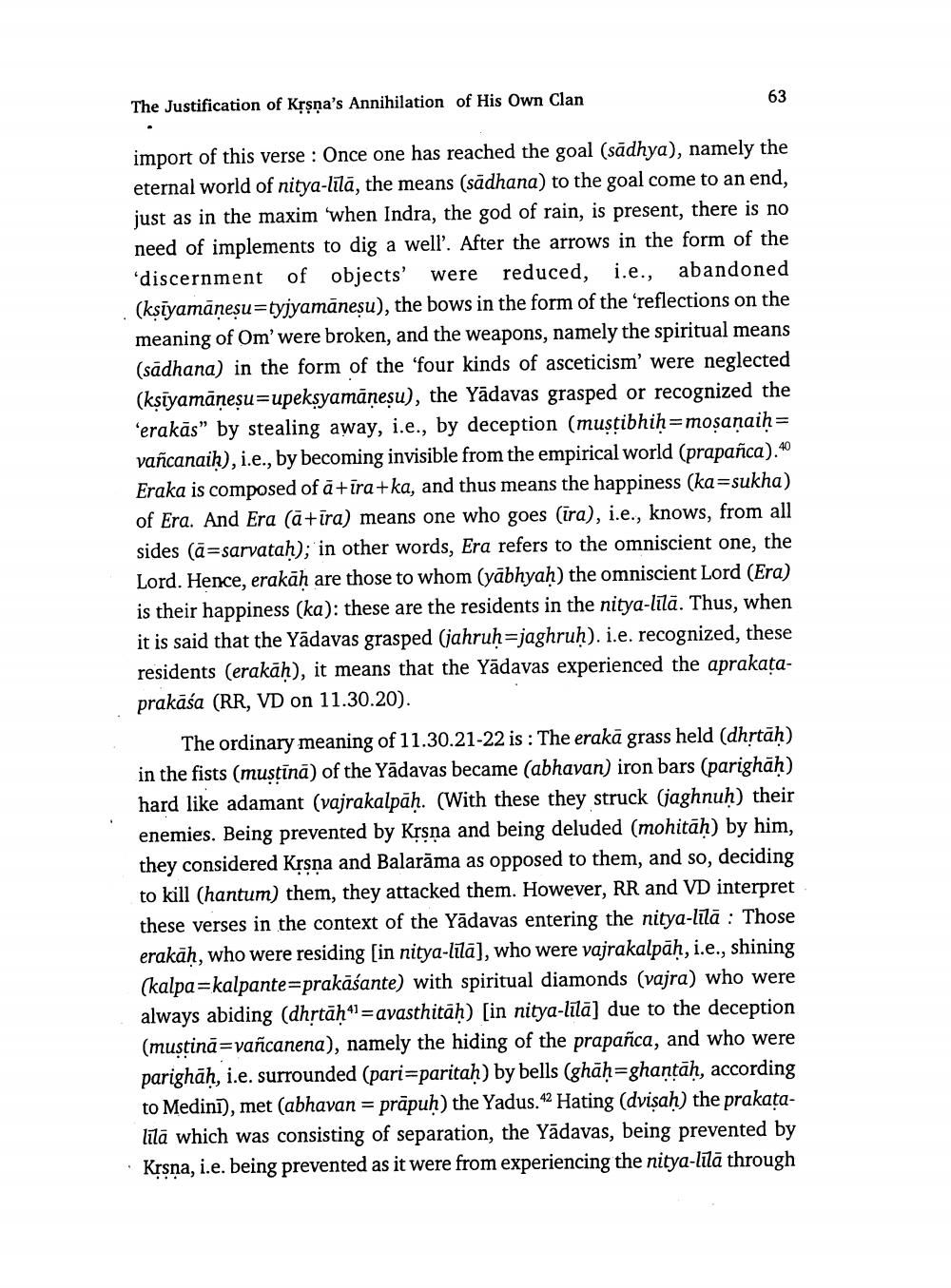________________
The Justification of Kṛṣṇa's Annihilation of His Own Clan
63
import of this verse: Once one has reached the goal (sādhya), namely the eternal world of nitya-lila, the means (sādhana) to the goal come to an end, just as in the maxim 'when Indra, the god of rain, is present, there is no need of implements to dig a well'. After the arrows in the form of the 'discernment of objects' were reduced, i.e., abandoned (ksiyamāneṣu=tyjyamāneṣu), the bows in the form of the 'reflections on the meaning of Om' were broken, and the weapons, namely the spiritual means (sadhana) in the form of the 'four kinds of asceticism' were neglected (kṣiyamāņeṣu=upekṣyamāņeṣu), the Yadavas grasped or recognized the 'erakās" by stealing away, i.e., by deception (mustibhih-mosanaiḥ= vañcanaiḥ), i.e., by becoming invisible from the empirical world (prapanca).40 Eraka is composed of a+ira+ka, and thus means the happiness (ka=sukha) of Era. And Era (a+ira) means one who goes (ira), i.e., knows, from all sides (a=sarvatah); in other words, Era refers to the omniscient one, the Lord. Hence, erakāḥ are those to whom (yabhyah) the omniscient Lord (Era) is their happiness (ka): these are the residents in the nitya-lila. Thus, when it is said that the Yadavas grasped (jahruḥ=jaghruh). i.e. recognized, these residents (erakāḥ), it means that the Yadavas experienced the aprakaṭaprakāśa (RR, VD on 11.30.20).
The ordinary meaning of 11.30.21-22 is: The erakā grass held (dhṛtāḥ) in the fists (musṭīnā) of the Yadavas became (abhavan) iron bars (parighāḥ) hard like adamant (vajrakalpāḥ. (With these they struck (jaghnuḥ) their enemies. Being prevented by Kṛṣṇa and being deluded (mohitaḥ) by him, they considered Krsna and Balarama as opposed to them, and so, deciding to kill (hantum) them, they attacked them. However, RR and VD interpret these verses in the context of the Yadavas entering the nitya-līlā: Those erakaḥ, who were residing [in nitya-lila], who were vajrakalpāḥ, i.e., shining (kalpa kalpante=prakāśante) with spiritual diamonds (vajra) who were always abiding (dhṛtāḥ"=avasthitaḥ) [in nitya-līlā] due to the deception (muṣṭinā=vañcanena), namely the hiding of the prapañca, and who were parighāḥ, i.e. surrounded (pari=paritaḥ) by bells (ghaāḥ=ghanṭāḥ, according to Medini), met (abhavan = präpuḥ) the Yadus. 42 Hating (dviṣaḥ) the prakaṭalila which was consisting of separation, the Yadavas, being prevented by Krsna, i.e. being prevented as it were from experiencing the nitya-lila through




